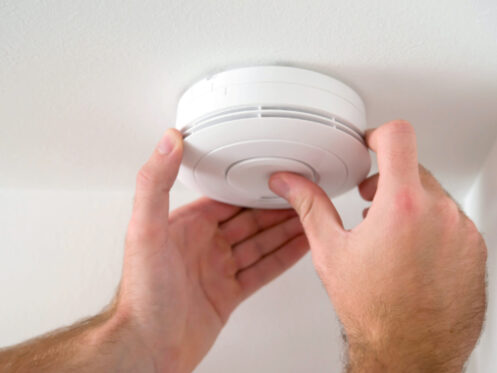Natural gas is primarily an extremely safe and efficient source for your cooking, heating, and household needs. However, it’s possible to experience a gas leak, and such instances can be quite hazardous to the health and safety of yourself and those within the immediate vicinity. Leaking gas can cause breathing issues, lightheadedness, and even carbon monoxide poisoning. In addition, the substance is extremely flammable, with the potential of causing a fire or even an explosion.
While such a leak can be scary, there are actions you can take to keep you, your loved ones, and your neighbors safe. Read on to discover how to recognize signs of a gas leak and what to do if you suspect one in your area.
Signs of a Gas Leak
It’s important to understand that not all gas leaks will be detectable by odor or other noticeable clues. However, in a significant portion of cases, you can expect to notice any number of the following signs.
- An odor of sulfur or rotten eggs
- Smell of petroleum or a gaseous odor
- A misty or dusty cloud near gas line
- Whistling, hissing, or roar sound near gas line
- Damage to gas pipe
- Bubbling water
- Liquid pool in basement area
- Dead plants or vegetation
In addition, take note if your gas bills have been higher than expected. This could be an indicator that gas is seeping out through a leak and into your home.
Common Symptoms
Various physical symptoms are likely to be experienced, depending on the extent of the leak. The reason such issues occur is due to the reduced oxygen in the air as the natural gas disperses throughout the environment. Leaks are particularly hazardous in indoor spaces with closed windows since there’s no way for the gas to escape.
Symptoms to be aware of may include:
- Feeling lightheaded
- Difficulty breathing
- Headaches
- Drowsiness
- Dizziness
- Eye or throat irritation
- Flu-like symptoms
- Nausea
- Ringing in ears
- Reduction in appetite
- Chest pain
- Nose bleeds
- Skin paleness or blistering
Your pets are also at risk for physical problems associated with gas leaks. Symptoms are often similar to those in humans. Because house pets are typically smaller in size, they may exhibit symptoms sooner or more intensely.
About Carbon Monoxide Poisoning
Carbon monoxide is released into the environment when gas doesn’t sufficiently burn. The symptoms of carbon monoxide poisoning are similar to those one might experience when exposed to natural gas. However, it’s extremely imperative to seek treatment when exposed to carbon monoxide due to its potentially lethal nature.
Some symptoms of carbon monoxide poisoning to watch for are:
- Dizziness
- Chest pain
- Abdominal pain
- Headaches
- Fatigue
- Nausea
- Pink skin
- Bright red lips
- Loss of muscle control
Steps to Take in the Event of a Gas Leak
There are some definitive steps you should take if you suspect a gas leak. Take action promptly, as it’s better to act with an abundance of caution in such situations. The first thing you’ll want to do is make sure all people and pets leave the building. Instruct everyone to leave the immediate vicinity on foot. In addition, it’s best to wait in an area that’s upwind from the source of the leak.
If it doesn’t pose a safety risk, you’ll want to take a moment to turn off any equipment that uses gas. Also turn off any ignitions such as the gas pilot light in order to avoid the possibility of a fire or an explosion. Open doors and windows before leaving if you feel safe doing so. As soon as the first adult makes it to safety, they should call the gas company, local emergency response such as 911, or the fire department.
This call should never be made from the house. Doing so has the potential to ignite a blaze. You may also need to take medical action if anyone is showing physical symptoms of exposure to natural gas or signs of carbon monoxide poisoning.
There are steps you should never take in the presence of a potential gas leak. Don’t:
- Look for the source of the leak
- Use lighters, matches, or candles
- Turn appliances or lights on or off
- Keep doors and windows closed
- Try to fix the leak
- Use the phone inside the home
- Neglect to report the leak
A gas leak poses a very serious hazard to people, pets, and property in the area. It’s crucial to take proper steps in order to prevent injury, illness, or death.
What to Do Following a Gas Leak
Before you can return to the home or business, there are some routine actions that must first occur. A certified inspector will need to confirm the leak. They do this with a device known as an adjusted electronic gas analyzer. The inspector will check for sources of leaks both inside the home and outside. If you suspect a natural gas leak, please know that Plumbtree Plumbing & Rooter can provide a 24/7 response in the San Jose area. Our team can test for leaking, repair leaks, and repipe entire gas systems.
You’ll need to receive official notice from a representative that it’s okay to go back inside. It’s a wise idea to take extra time to be sure the house or office is aired out completely to avoid exposure to any lingering fumes.
It’s also in your best interest to schedule a follow-up wellness check with your physician if a leak is confirmed. This is because long-term exposure to even small amounts of natural gas can affect your health. Such issues as respiratory difficulties and depression can occur.
Preventing Gas Leaks
Detecting a gas leak in your house or business can be a scary situation. Fortunately, there are some steps you can take to reduce the risk of a gas leak occurring in the first place.
You’ve taken the first step by becoming educated and reading this article. Share what you’ve learned about gas safety with those in your household and within your social networks as well. Scheduling regular inspections of your gas pipelines and appliances on a yearly basis is also recommended. The chimneys, flues, vents, and furnace in your home should receive an annual inspection, too. Always keep a fire extinguisher on hand, and be sure to install carbon monoxide detectors on each floor of your house to increase your safety.
The experts at Plumbtree Plumbing & Rooter want you and your loved ones to stay safe and comfortable. Don’t hesitate to contact us for assistance should you be in need of gas services in the San Jose area. We can also help with any kind of emergency plumbing issue. Other services we provide include water heater repair and installation as well as toilet, and sink repairs.

